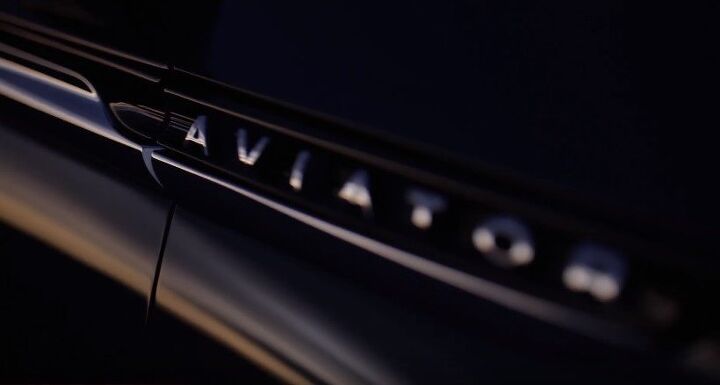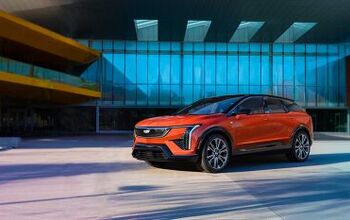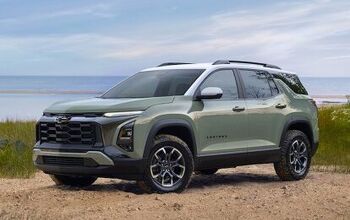Lincoln Officially Dusts Off the Aviator Name, Prepares for a Future That's Short on Tradition, Big on Cargo

Given the direction Lincoln is headed, it’s unlikely we’ll see a return of the Town Car name anytime soon. The Town Coupe, on the other hand, seems ripe for a resurrection (as a sporty four-door SUV, of course).
Speculation aside, model names are back at Lincoln Motor Company, and the first of a series of all-new utility models will bear a short-lived moniker that disappeared after 2005: Aviator. The original Aviator, resembling a Navigator washed in too-warm water, served as the brand’s second SUV from 2003 to 2005. A 2004 concept vehicle of the same name heralded the design of the 2007 MKX.
What does the new Aviator mean for the brand? Sales, hopefully, as the brand’s suddenly flagging fortunes would leave any automaker rattled.
The Aviator, one of two all-new utility vehicles promised by Lincoln by 2020, should appear in production form next year. We’ll get a strong taste of it at this month’s New York Auto Show, where Lincoln plans to unveil a production preview. Until then, a short teaser video gives us something to look at, but not much to go on.
Sharing its modular CD6 architecture with the 2020 Ford Explorer, the Aviator serves as a bridge between the Nautilus (formerly MKX) and the range-topping Navigator. Expect the same rear-biased driving experience as the Explorer, plus a range of powerful engines. It’s likely we’ll see the brand’s twin-turbocharged 3.0-liter V6 offered as an upgrade — a source tells us Ford plans to use that engine in the upcoming Explorer’s ST variant.
A hybrid version is ensured, as Ford promised this week that all new vehicle introductions will contain some form of electrification.
Lincoln’s product strategy is best summed up as “RIP, cars.” Jim Farley, head of global markets at Ford Motor Company, claims four more Lincoln SUVs will arrive after 2020, and it’s doubtless one will serve as a technological flagship for the automaker. That means a battery electric model. What Farley didn’t say, however, was whether cars have a future at Lincoln. The Fusion-based MKZ and Continental are widely expected to disappear around 2020, leaving the brand carless for the first time in its history.
Lincoln sales bottomed out shortly after the recession, but a multi-billion-dollar cash infusion from Ford brought the brand back from near death. Well, part of the way back. The brand’s 2017 U.S. sales fell below 2016’s tally by 565 vehicles. February saw Lincoln sales fall 23.4 percent, year over year, with only the new Navigator posting a gain. Sales of the compact MKC and MKX fell 20.9 and 24.2 percent, year over year, and Lincoln’s car models fared even worse.
Brand sales over the first two months of 2018 reveal a continued decline. Compared to the same period last year, Lincoln racked up 25.2 percent fewer U.S. sales in 2018, pointing to a lineup that, for the most part, no longer resonates in the competitive (and often fickle) premium segment.
[Images: Lincoln Motor Company/ YouTube]

More by Steph Willems
Latest Car Reviews
Read moreLatest Product Reviews
Read moreRecent Comments
- V8fairy Headlights that switch on/off with the ignition - similar to the requirement that Sweden has- lights must run any time the car is on.Definitely knobs and buttons, touchscreens should only be for navigation and phone mirroring and configuration of non essential items like stereo balance/ fade etc>Bagpipes for following too close.A following distance warning system - I'd be happy to see made mandatory. And bagpipes would be a good choice for this, so hard to put up with!ABS probably should be a mandatory requirementI personally would like to have blind spot monitoring, although should absolutely NOT be mandatory. Is there a blind spot monitoring kit that could be rerofitted to a 1980 Cadillac?
- IBx1 A manual transmission
- Bd2 All these inane posts (often referencing Hyundai, Kia) the past week are by "Anal" who has been using my handle, so just ignore them...
- 3-On-The-Tree I was disappointed that when I bought my 2002 Suzuki GSX1300R that the Europeans put a mandatory speed limiter on it from 197mph down to 186mph for the 2002 year U.S models.
- ToolGuy Did anyone catch that Boeing Starliner launch earlier tonight?




































Comments
Join the conversation
I'm glad they're going back to real names, but I always find it odd when they give big, heavy, cumbersome vehicles fast, light and athletic names. "Aviator" comes to mind, although the Sprinter vans take the cake.
I would just like to point out that the trim alignment on that Aviator (first picture) is appalling.